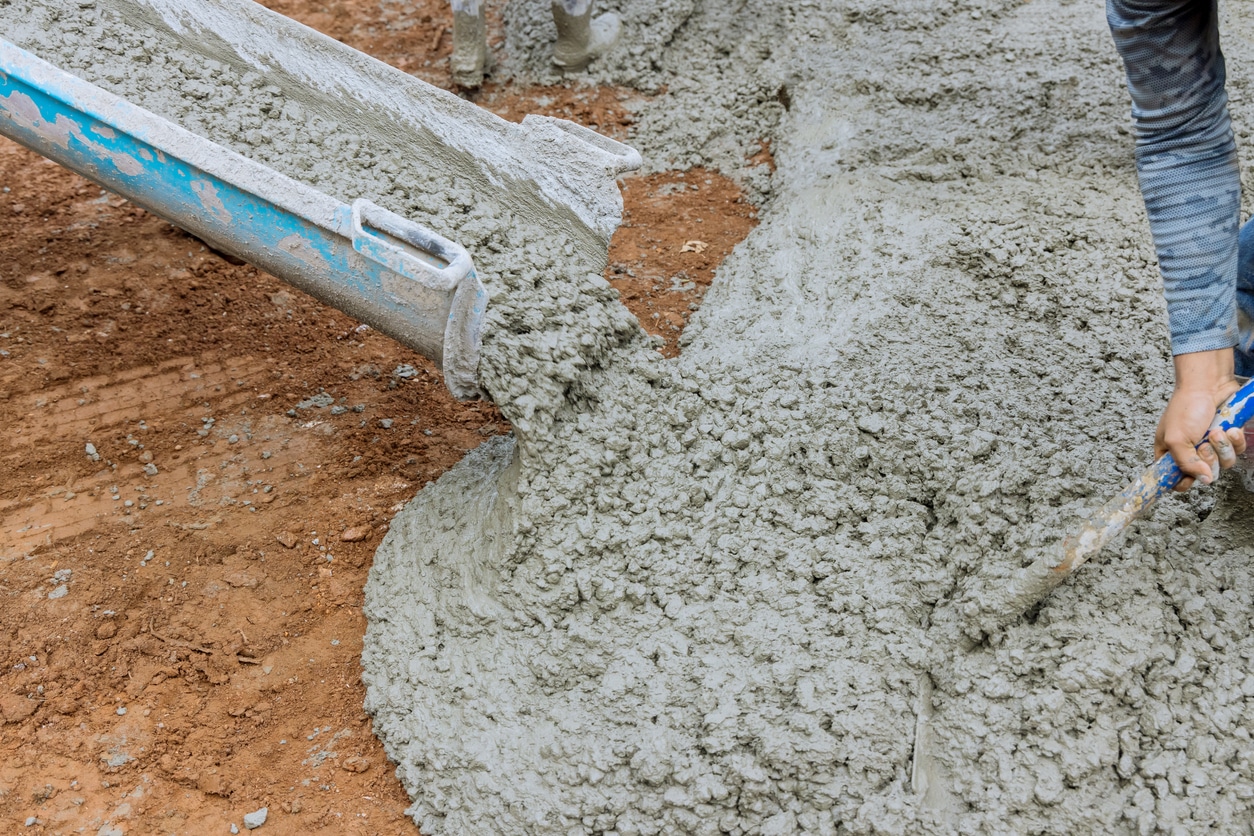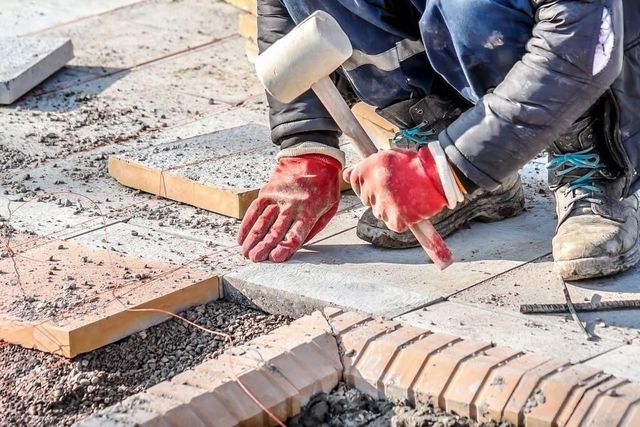
Comprehending the Vital Duty of a Concrete Contractor in Modern Construction and Layout
Concrete service providers are important to the building and construction and design industries. Their expertise guarantees that frameworks are not only durable however likewise cosmetically pleasing. They take part in various obligations, from project intending to top quality control, and collaborate with engineers and designers. With developing innovations and fads, their role is much more important than ever before. Understanding their effect can disclose understandings into modern construction methods and the future of structure style.
The Relevance of Concrete in Building and construction
Although different materials are employed in building and construction, concrete stays a cornerstone of contemporary structure practices as a result of its strength, convenience, and resilience. This composite material, made from cement, water, and accumulations, can endure significant anxiety and is resistant to fire, weather condition, and pests, making it perfect for varied applications. Concrete's flexibility permits it to be molded into numerous forms and dimensions, promoting ingenious building designs.
In addition, its thermal mass buildings add to energy efficiency, assisting to regulate interior temperature levels. The extensive schedule of raw materials and the fairly low expense of concrete additionally boost its charm for large-scale tasks, from industrial buildings to facilities like bridges and roadways. As urbanization proceeds to rise, the need for trusted and lasting building products strengthens concrete's crucial function in building, making it a basic selection for architects and builders going for longevity and durability in their jobs.
Secret Obligations of a Concrete Contractor
Concrete professionals play an important duty in the building and construction process, with several vital duties that ensure task success. Their jobs consist of project planning and layout, product option and administration, along with preserving quality assurance and guarantee throughout the project lifecycle. Comprehending these obligations is crucial for appreciating the contractor's influence on building and construction end results.
Task Planning and Style
When beginning on a building and construction job, efficient task preparation and style play an essential duty in a concrete service provider's obligations. The professional has to work together carefully with designers, designers, and customers to understand the job's objectives and specifications. This involves assessing site problems, evaluating layout needs, and figuring out the extent of job. A concrete professional is likewise accountable for creating budgets and timelines, ensuring that all phases of the project align with general objectives. Additionally, they need to expect potential obstacles and create options to preserve job effectiveness. By meticulously planning and making each facet of the concrete work, the professional establishes the foundation for successful execution, guaranteeing architectural honesty and adherence to security criteria throughout the construction process.
Product Selection and Monitoring
Reliable product option and monitoring are important responsibilities for a concrete specialist, as these choices straight influence the quality and longevity of the final framework. Concrete contractors should examine different products, including aggregates, admixtures, and support types, to assure they satisfy project specs and ecological conditions. They must consider factors such as toughness, workability, and resistance to weathering. Additionally, managing the supply chain is necessary, as prompt delivery of products can extremely influence project timelines. Contractors should preserve relationships with distributors to protect high-quality sources while also checking supply levels to stay clear of scarcities or unwanteds. Inevitably, this cautious choice and management of materials add to the general success of construction tasks and the long life of the structures constructed.
Quality Control and Assurance
Quality assurance and assurance are extremely important in the construction market, particularly for concrete contractors tasked with providing reputable and durable frameworks. Concrete specialists have to apply strenuous top quality control measures throughout the construction process, assuring that all materials fulfill defined requirements and guidelines (Concrete Contractor in Dallas). This includes monitoring the blending, pouring, and curing processes to avoid issues and improve architectural integrity. Normal evaluations are important, enabling contractors to determine and rectify issues quickly. Additionally, concrete professionals frequently work together with designers and architects to ensure that the final item straightens with design specs. By sticking to rigid quality control procedures, concrete contractors not only protect the longevity of their job however additionally copyright the trust of customers and stakeholders in the building and construction industry
Kinds Of Projects Managed by Concrete Service Providers
Although concrete service providers are usually related to massive building tasks, their know-how encompasses a diverse array of applications. These specialists are indispensable to household projects, such as outdoor patios, driveways, and foundations, ensuring resilience and visual allure. In industrial construction, they contribute to the creation of floors, pathways, and structural components that fulfill details layout and safety and security requirements.
Moreover, concrete professionals are entailed in infrastructure jobs, including bridges, tunnels, and roadways, where their abilities ensure structural integrity and durability. They also play a crucial role in attractive concrete applications, such as stamped concrete and sleek surface areas, which improve the aesthetic element of numerous spaces. Furthermore, their solutions reach repair and upkeep job, attending to issues like fracturing or disintegration in existing frameworks. This adaptability underscores the vital duty concrete service providers play in both ornamental and functional aspects of modern building and construction and layout.
Skills and Certifications Called for
Concrete professionals must have a diverse collection of qualifications and abilities to efficiently take care of the series of projects they take on. Proficiency in concrete blending, pouring, and completing is essential, as is a strong understanding of numerous kinds of concrete, consisting of reinforced and decorative alternatives. Knowledge of building and construction methods, website here blueprints, and task management principles is vital for successful implementation.
Physical endurance and toughness are crucial due to the requiring nature of the job. Specialists must likewise have solid analytic abilities to address unanticipated challenges during jobs. Interaction abilities are essential for collaborating with clients, engineers, and various other tradespeople.
Furthermore, obtaining appropriate qualifications can improve a service provider's integrity and broaden their job possibilities. Constant education and learning in new strategies and products keeps specialists competitive in a swiftly advancing sector. These certifications and skills jointly allow concrete service providers to provide premium results successfully and properly.
The Duty of Concrete Contractors in Security Conformity
Making sure security compliance is a fundamental obligation of concrete specialists, as they browse the complexities of construction sites. These professionals are entrusted with sticking to rigid safety and security regulations and standards, which are essential for protecting against accidents and guaranteeing the health of all website workers. TJ Concrete Contractor. Concrete contractors must implement complete safety strategies that include training workers on proper equipment use and safety methods
In addition, they are in charge of examining products and work processes to identify possible threats. By performing normal safety and security audits and risk assessments, concrete service providers can proactively resolve concerns before they escalate. They team up with various other construction professionals, such as designers and project supervisors, to incorporate safety and security steps right into the overall project strategy. Ultimately, the dedication of concrete professionals to security compliance not only shields workers but additionally boosts job efficiency and top quality, strengthening their important function in contemporary building and construction.
Patterns and Technologies in Concrete Layout
Current developments in concrete design have presented a series of patterns and developments that prioritize sustainability and aesthetics. Sustainable concrete solutions, attractive finishing techniques, and wise concrete innovations are reshaping the industry. These advancements not just enhance structural integrity but likewise add to ecologically responsible building techniques.
Lasting Concrete Solutions
As the construction sector significantly prioritizes sustainability, ingenious concrete solutions are emerging to lower ecological influence while enhancing efficiency. One prominent pattern is making use of recycled materials, such as crushed concrete and industrial by-products, which not only decreases waste however also boosts the concrete's properties. Advancements in admixtures, consisting of fly ash and slag, contribute to decreased carbon discharges throughout manufacturing. One more considerable development includes the development of permeable concrete, which allows water to flow through and minimizes runoff, alleviating flooding and groundwater deficiency. Furthermore, the surge of carbon capture modern technologies in concrete manufacturing holds promise for additional exhausts reduction. These sustainable concrete services exemplify the industry's commitment to eco liable building and construction practices.

Ornamental Finishing Techniques
A myriad of ornamental ending up methods have actually emerged in concrete design, changing simple surface areas into visually striking elements. Strategies such as marking, discoloration, and brightening enable a variety of aesthetic possibilities, dealing with diverse layout choices. Stamped concrete mimics natural materials like rock and brick, while staining introduces dynamic shades that boost the surface area's allure. Sleek concrete, understood for its smooth finish, adds class to both domestic and industrial areas. Furthermore, microtopping and overlay systems supply innovative alternatives for revitalizing existing concrete. These techniques not just enhance the aesthetic characteristics however likewise boost longevity and upkeep. As fads advance, the combination of decorative surfaces continues to play a vital function in contemporary construction, weding performance with imaginative expression.

Smart Concrete Technologies
While conventional concrete remains a staple in building, the introduction of clever concrete innovations is changing the market by incorporating advanced functions that enhance performance and sustainability. These technologies consist of self-healing concrete, which uses ingrained microorganisms that turn on upon cracking, and sensor-equipped concrete that keeps track of structural health in real-time. Additionally, thermochromic and piezoelectric concrete can adapt to ecological changes and produce electrical power, specifically. The execution of recycled products and green ingredients also contributes to minimizing the carbon footprint of concrete manufacturing. As these innovations remain to progress, they assure to improve resilience, reduced upkeep costs, and promote greener structure practices, making them essential for future building and construction tasks. The duty of concrete contractors is increasingly substantial in using these advancements.
Often Asked Concerns
What Factors Influence Concrete Rates in Building And Construction Tasks?
Concrete prices in building and construction tasks is influenced by product costs, labor expenditures, task size, location, schedule of sources, and market demand. Seasonal variables and transportation expenses can additionally greatly affect the total pricing framework.
How Do Weather Impact Concrete Work?
Climate condition greatly affect concrete work; severe temperatures, moisture, and precipitation can affect setting times, curing internet processes, and total top quality - TJ Concrete Contractor. website here Professionals need to adapt their methods and routines to reduce these ecological effects for effective task conclusion
What Is the Typical Timeline for a Concrete Task?
A typical concrete task timeline varies from a few days to several weeks. Factors affecting this period include job size, complexity, climate problems, and healing times, which jointly figure out the overall completion schedule.
Can Concrete Service Providers Aid With Design Appointments?
Concrete service providers can undoubtedly assist with layout examinations, supplying beneficial understandings on product choice, architectural integrity, and visual choices, making certain that projects meet both practical requirements and the client's vision for the finished product.
What Are Common Mistaken Beliefs Concerning Concrete Longevity?
Typical mistaken beliefs about concrete durability include the belief that it is unsusceptible damage and that all kinds are equally strong. In truth, elements like mix design, environmental problems, and upkeep considerably affect concrete's lasting performance.
They likewise play a crucial role in attractive concrete applications, such as stamped concrete and sleek surface areas, which enhance the aesthetic aspect of various spaces. Effectiveness in concrete mixing, putting, and ending up is important, as is a solid understanding of numerous kinds of concrete, consisting of enhanced and attractive choices. One famous pattern is the use of recycled products, such as smashed concrete and industrial results, which not just lowers waste yet additionally boosts the concrete's residential properties. While typical concrete continues to be a staple in building and construction, the introduction of clever concrete innovations is reinventing the sector by incorporating sophisticated functions that boost performance and sustainability. These developments include self-healing concrete, which uses embedded bacteria that trigger upon fracturing, and sensor-equipped concrete that monitors structural health in real-time.